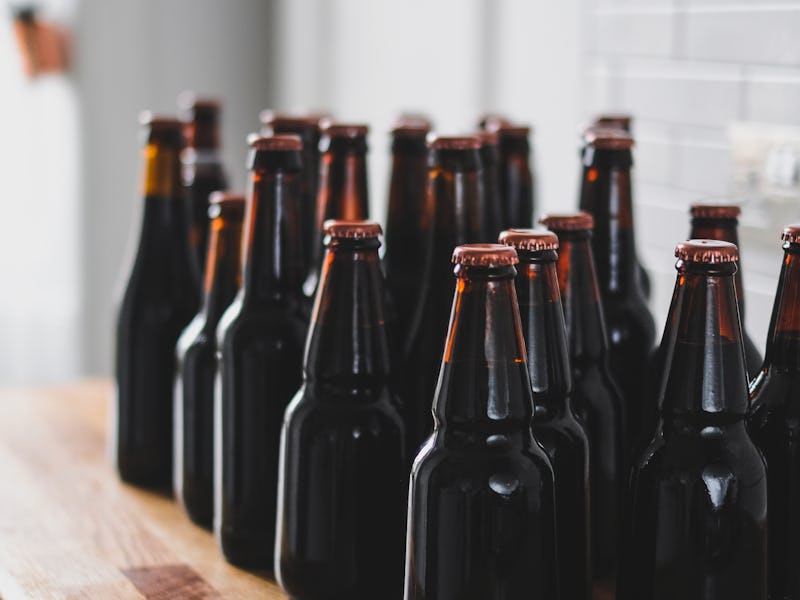Psychedelics' Role in Beating Alcoholism Illustrated in LSD, Psilocybin Study
"There's incredible potential here."

In the ‘50s through the ‘70s, psychedelic drugs were studied for their potential to help people stop problematic drinking. At the time, the research primarily focused on the effects of lysergic acid diethylamide (LSD), which seemed to help curb alcohol addiction, albeit not consistently. Now, after the 50-year research hiatus necessitated by the drug’s illegal status, scientists are once again finding psychedelics like LSD as well as psilocybin to be useful tools in fighting addiction, as research published Tuesday in The Journal of Psychopharmacology illustrates.
Matthew Johnson, Ph.D., an associate professor at Johns Hopkins University School of Medicine, tells Inverse that this work is a “thread that was left dangling” from that earlier era of research. In the paper, Johnson and colleagues present evidence that psychedelics can lead to a reduction — and sometimes complete cessation — of problematic alcohol use.
To gather their data, the team recruit participants through social media and websites devoted to drug discussion and research, including the Erowid Center and the Multidisciplinary Association for Psychedelic Studies (MAPS). Through anonymous online surveys, they collected data on 343 participants who were predominantly white, male, and American, and, importantly, had reported at least seven years of problematic drinking before they had a psychedelic experience.
Of the group, 72 percent met the criteria for alcohol use disorder, and 74 percent reported they had either used LSD or psilocybin, the psychoactive molecule in “magic” mushrooms. Out of those who took the drugs, 62 percent were looking for a spiritual experience or wanted to explore their psychological state.
A tab of LSD.
Just 10 percent of this group took the drugs with the hope they could help them reduce their reliance on alcohol. But as it turns out, the majority of the participants still experienced a change in their drinking habits after taking the drugs.
The survey results showed a dramatic change in the number of alcoholic drinks people consumed before taking a “moderate or high dose” of either LSD or psilocybin and the number of drinks they were consuming a year later. After their drug experience, 83 percent of the participants no longer met the criteria for having alcohol use disorder. In turn, 28 percent of the participants reported that their psychedelic experience was the reason they decided to change their lifestyle.
Dried magic mushrooms.
How Psychedelics May Help With Addiction
It’s the nature of the psychedelic experience that predicts long-term success when it comes to addiction, says Johnson. Psychedelic drugs, he explains, have effects that are more similar to psychotherapy than to traditional medications for combatting alcohol addiction. In other words, while psychedelics do actively interact with the brain, their benefits manifest in the experiences a person has after consumption.
“When you talk to someone who has managed to overcome addiction, they often talk about who they had to answer big picture questions that connect to what’s important in life,” Johnson says. “Psychedelics prompt those kinds of questions. Even though we have a lot more to explore, I think it’s likely that its the intense nature of the drug’s psychological experience that’s underlying its high success rates.”
The results are in line with previous findings from Johns Hopkins, which found that psilocybin was much more effective in helping long-term smokers quit compared to the smoking cessation drug varenicline. Currently, there are a number of ongoing studies at the university examining how psychedelics can induce behavior change across a range of disorders, including anorexia and opioid addiction.
In regards to this study, Johnson says the goal is to keep following the data and, if it looks like it’s effective and safe, pursue a path where it can eventually be approved for treatments outside of research use — much like the current path MDMA is on.
“There’s incredible potential here,” Johnson says. “So far, it’s a good bet that these tools will be broadly applicable to a number of disorders.”
Abstract:
Background: Meta-analysis of randomized studies using lysergic acid diethylamide (LSD) for alcohol use disorder (AUD) showed large, significant effects for LSD efficacy compared to control conditions. Clinical studies suggest potential anti-addiction effects of LSD and mechanistically-related classic psychedelics for alcohol and other substance use disorders.
Aims: To supplement clinical studies, reports of psychedelic use in naturalistic settings can provide further data regarding potential effects of psychedelics on alcohol use.
Methods: An anonymous online survey of individuals with prior AUD reporting cessation or reduction in alcohol use following psychedelic use in nonclinical settings.
Results: 343 respondents, mostly White (89%), males (78%), in the USA (60%) completed the survey. Participants reported seven years of problematic alcohol use on average before the psychedelic experience to which they attributed reduced alcohol consumption, with 72% meeting retrospective criteria for severe AUD. Most reported taking a moderate or high dose of LSD (38%) or psilocybin (36%), followed by significant reduction in alcohol consumption. After the psychedelic experience 83% no longer met AUD criteria. Participants rated their psychedelic experience as highly meaningful and insightful, with 28% endorsing psychedelic-associated changes in life priorities or values as facilitating reduced alcohol misuse. Greater psychedelic dose, insight, mystical-type effects, and personal meaning of experiences were associated with a greater reduction in alcohol consumption, controlling for prior alcohol consumption and related distress.
Conclusions: Although results cannot demonstrate causality, they suggest that naturalistic psychedelic use may lead to cessation or reduction in problematic alcohol use, supporting further investigation of psychedelic-assisted treatment for AUD.